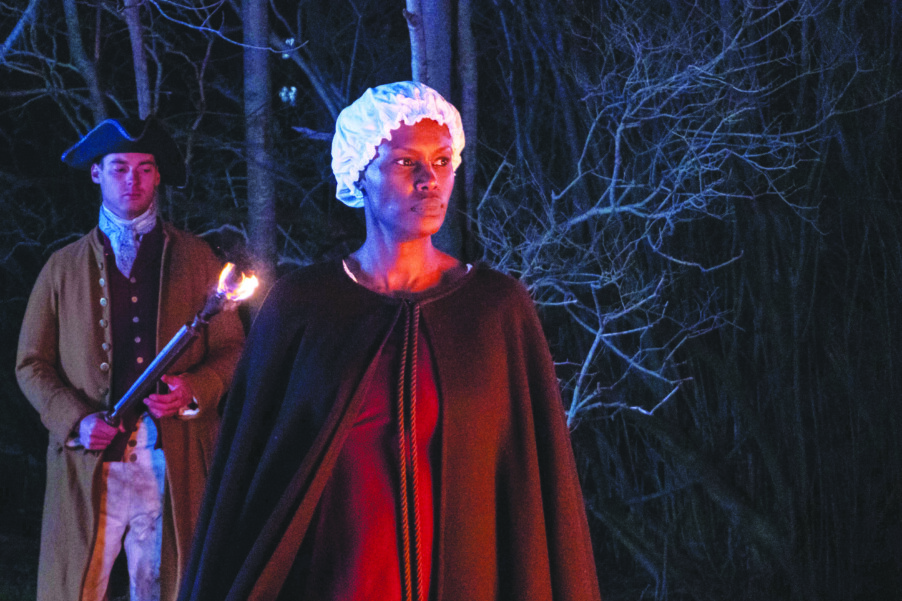Filmmaker looks at colonial territories
Jay Craven is an award-winning veteran New England filmmaker. He spoke with the Hippo about his 10th narrative feature film, Lost Nation. Craven is known for making Northern New England Westerns. His titles include Where the Rivers Flow North with Rip Torn and Michael J. Fox, Disappearances with Kris Kristofferson, and Northern Borders with Bruce Dern. He has taught for 25 years at Marlboro College in southern Vermont as well as Sarah Lawrence College. At Marlboro he educates students on how to make movies by involving them in the movie-making process. Lost Nation will kick off a series of New Hampshire screenings at Red River Theatres on Friday, Dec. 13, running through Thursday, Dec. 19. Craven will be appearing at select showings that opening weekend. Visit redrivertheatres.org for more information.
Would you like to give a brief overview of the film?
It’s basically a historical action drama and it’s set in the North Country during the period of the American Revolution. It involves the fact that the huge territory that is now considered Vermont was contested territory at that time between New York and the territory. Meanwhile, a scrappy and some could argue somewhat corrupt New Hampshire governor, Benning Wentworth, started issuing titles to poor farmers and settlers coming out of southern New England, New York claimed. It precipitated an intense struggle between the settlers who were settling the land and New York, which late in the game decided they’d better start settling the land or else it was going to disappear.
A drama unfolded where the New Hampshire grants holders, led by Ethan Allen and others — Ethan Allen considered sort of a founding father of Vermont — resisted New York encroachments on the land that they were settling. It’s the drama of this land conflict between New Hampshire and New York, led by the settlers on the New Hampshire grants. Ethan Allen is a central character, and also Lucy Terry Prince, who was a pioneering Black poet who settled with her family on a New Hampshire grant in southeastern what is now Vermont, Guilford, near Brattleboro, an area that was a stronghold of New York sentiment. It was a very turbulent setting for them to try to both settle their homestead, also as Black people. The film captures the drama of land and freedom — in the case of Ethan Allen, on a huge scale, involving the entire state of Vermont, which frankly he and his brother ended up owning 200,000 acres, because they were land speculators, too. And on a smaller scale, the Prince family, which was trying to simply secure and develop their 100-acre homestead using a New Hampshire grant. It’s a historical action drama around the high-stakes land struggle between New Hampshire and New York, which resulted in that contested territory becoming at first the independent republic of Vermont and later the state of Vermont.
Would you want to go more in depth on Lucy Terry Prince?
Yeah, Lucy Terry Prince was enslaved at the age of 3 to a family in western Massachusetts for 30 years, serving that family, but she also was a poet, and only one of her poems actually survives, which is called ‘Bars Fight,’ about the 1746 Deerfield Massacre, where indigenous fighters allied with the French attacked settlers in Deerfield, Massachusetts. Her poem told the story and was known far and wide and was passed on orally, but it’s the first known work of African American literature. And she was known for convening sort of story soirees on the porch of the family that she was working for, of their house, and would bring by storytellers and poets and people making up stuff as they went along. Another former slave, Abijah Prince, married her and bought her freedom with money that he earned fighting in the French and Indian War, and he was gifted this 100-acre plot of land in Guilford, and over five years developed [it] and brought his family here. When they brought their family here, their closest neighbor became an antagonist, wanting their land and also just sort of harassing them and making their life very difficult. You know, spoiling their crops and scattering their feed to the wind and letting their animals loose and, you know, attacking and beating them and burning their hay rake and stuff like that, so Lucy developed a strategy essentially to defend her family in the moment but more so in court all the way to what was called in Vermont the governor’s supreme council. [She] prevailed, you know, which would have been extremely unusual, frankly, for a woman, let alone a Black woman, to accomplish during this time. She was smart, and she was not going to take it lying down, and she, in what was already a very turbulent, deeply divided political situation, was able to push through and assert her family’s rights and two of her sons fought the American Revolution. Only one of her poems survives, but … she was definitely known as a storyteller and to a certain extent a visionary. … So it’s two different stories of the struggle for land and freedom, one on a big scale, one on a small intimate scale, but they are parallel and they overlap briefly.
With Ethan Allen, could he be considered a founding father of New Hampshire as well?
Well, he was working under New Hampshire jurisdiction when he started the struggle, so absolutely he would have been considered a New Hampshire pioneer because it was New Hampshire territory that he was defending against New York, so in some ways Vermont was born out of New Hampshire and was born out of a sort of, we could call solidarity, generosity, imagination, greed, whatever you want to call it. But no, there’s no question that when Ethan began his land struggle against New York, he was doing it on behalf of the New Hampshire granted territory.
How did this whole specific situation arise?
Benning Wentworth, the New Hampshire governor, commissioned 131 towns in that territory and he kept parcels of land in each town that were his, but they were running a pretty active land business. If it weren’t for this land struggle, the territory of Vermont would be New York. Although, what we also show in the movie is that when things got tough in this land struggle, Ethan Allen and his brother entered negotiations with the British during the American Revolution to actually deliver that territory to the British. So it could have also ended up part of Canada because there were some attacks coming from Quebec into Vermont. The Americans were not defending them and the Continental Congress did not like what Ethan was doing, because New York had a lot of power in the Continental Congress, including the fact that Alexander Hamilton was a representative from New York. Likewise, the governor of New York, George Clinton, was a very powerful figure. Ethan went to the Continental Congress twice begging the case of vermont or the territory against New York and was rejected.
What area of land is this referencing? What would it have made the United States look like today?
Well it would have been the whole state of, the area that is currently the whole state of Vermont would have been New Hampshire, all the way over to Lake Champlain. Because it’s interesting, New Hampshire Gov. Benning Wentworth, the New Hampshire governor, claimed he settled it first and established political control on the entire western part of the state. So it was odd. The area that was closest to New Hampshire was controlled by New York. The area that was closest to New York was controlled by New Hampshire. … I mean, it was intense. But then the film goes over how all the colonies came into their own statehood. —Zachary Lewis


